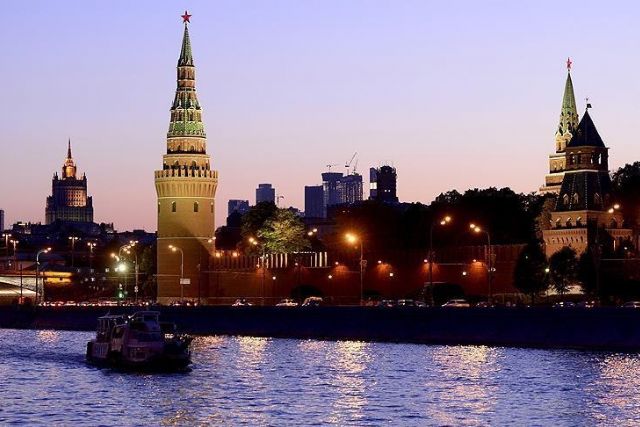Putin asks Biden for guarantees that NATO won't expand further east: Kremlin
Russia 'seriously interested' in obtaining reliable, legally fixed guarantees excluding NATO expansion in eastern direction

ANKARA
Russian President Vladimir Putin asked his US counterpart Joe Biden during a two-hour video call for guarantees that NATO will not expand eastward, the Kremlin announced Tuesday.
The critical meeting between the two leaders took place amid escalating tensions over Ukraine with a steady buildup of Russian troops along its neighbor's border.
"Russia is seriously interested in obtaining reliable, legally fixed guarantees excluding the expansion of NATO in the eastern direction and the deployment of offensive strike weapons systems in the states adjacent to Russia," the Kremlin's statement said.
In the "frank" and "businesslike" meeting, Putin and Biden spoke about the implementation of the results of the US-Russia presidential summit held in Geneva in June this year, a historic summit where the two leaders met for their first face-to-face talks since Biden took office in January.
"The importance of consistent implementation of the agreements reached at the highest level and the preservation of the 'spirit of Geneva' when considering issues of bilateral relations and other problems arising between Russia and the US was noted," it said.
During the video call, the presidents recalled the alliance of the two countries during World War II and emphasized that the sacrifices made then should not be forgotten and the alliance itself should serve as an example for building contacts and working together in today's realities.
"The predominant place in the conversation was occupied by problems related to the internal Ukrainian crisis and the lack of progress in the implementation of the 2015 Minsk Agreements, which are the uncontested basis for a peaceful settlement."
The Minsk agreements were signed to stop the ongoing conflict between pro-Russian separatists and the Kyiv administration. The agreements included a cease-fire in the region and prisoner exchange while also allowing Kyiv to adopt a constitutional amendment that would give Ukraine's Donbas region a special status.
The pro-Russian separatist forces, on the other hand, were supposed to withdraw from the Ukrainian-Russian border. However, implementation of the agreements has been hampered as the two sides accuse each other of violating the cease-fire
The statement underlined that Putin, using specific examples, illustrated the "destructive line of Kyiv, aimed at the complete dismantling of the Minsk agreements," which were reached in the Normandy format, and expressed "serious concern about Kiev's provocative actions against Donbas."
Longstanding tensions over Russia's illegal annexation of Crimea in 2014 have been exacerbated by Russian-backed separatists in the eastern border region of Donbas, along with a Russian military buildup decried by the West.
Earlier the day, the White House announced that Biden threatened to respond with "strong economic measures” if Russia escalates military action against Ukraine and reiterated his support for Ukraine's sovereignty and territorial integrity and called for de-escalation and a return to diplomacy.
Putin responded that the responsibility "should not be shifted onto the shoulders of Russia" and that it was NATO who is "making dangerous attempts to conquer Ukrainian territory and is building up its military potential" at Russia's borders.
Speaking on information security, both sides emphasized the importance of an actively ongoing dialogue on this issue and expressed their readiness to continue practical cooperation in the criminal procedural and operational-technical areas of the fight against cybercrime, the Kremlin statement added.
- Iranian nuclear program
Exchanging views on the Joint Comprehensive Plan of Action (JCPOA) for Iran's nuclear program, Putin noted the importance of its full implementation within the initially agreed framework.
"The leaders expressed the hope that the negotiations on this issue, resumed at the end of November in Vienna, will be held in a constructive spirit and will allow reaching decisions acceptable to all participants."
Following a five-month break, Iran and world powers resumed their talks in the Austrian capital Vienna last week in a last-ditch attempt to restore the 2015 nuclear accord that former US President Donald Trump's administration withdrew from in May 2018.
The talks, however, ended without achieving a breakthrough.
Putin and Biden, discussing bilateral issues, highlighted that cooperation between Moscow and Washington is still at an "unsatisfactory" level, noting that "curtailed" diplomatic missions of both countries contributed a lot to this matter.
"Vladimir Putin stressed that all this is a consequence of the line of the American authorities, which five years ago began to practice large-scale restrictions, bans and mass expulsions of Russian diplomats, to which we are forced to react in a mirror-like manner. The Russian side proposed to nullify all the accumulated restrictions on the functioning of diplomatic missions, which could also serve to normalize other aspects of bilateral relations," said the statement.
The presidents also agreed that Russia and the US will continue dialogue and necessary contacts for maintaining international security and stability.





